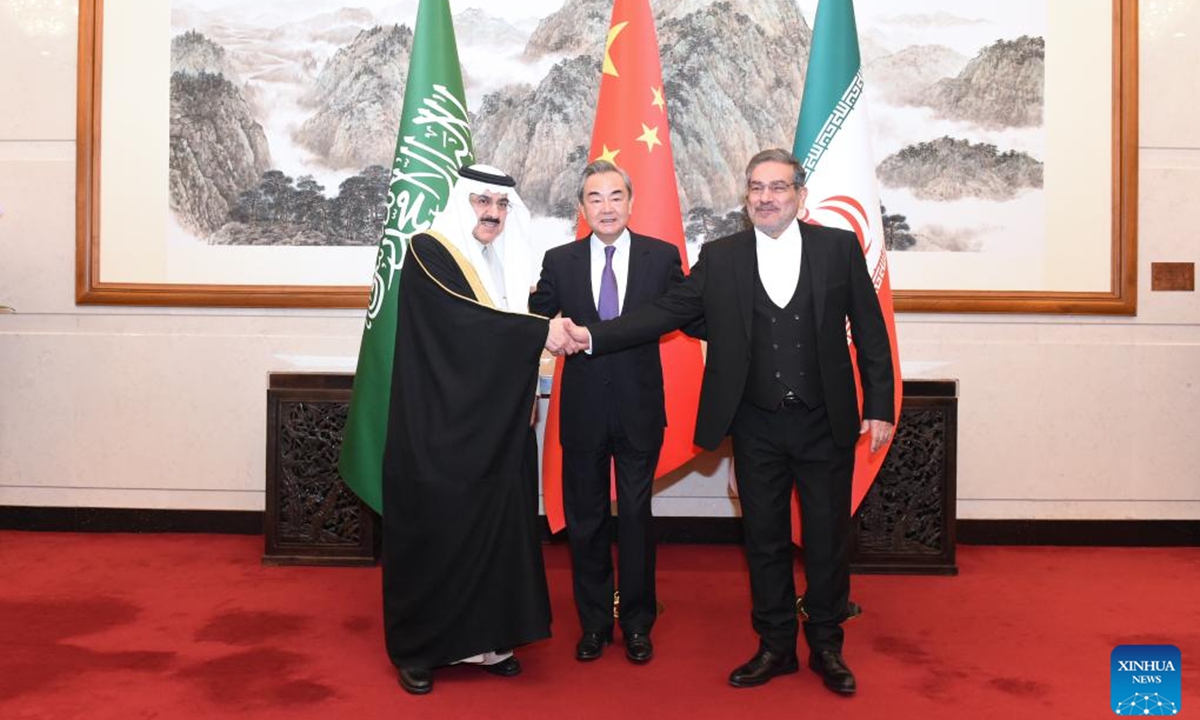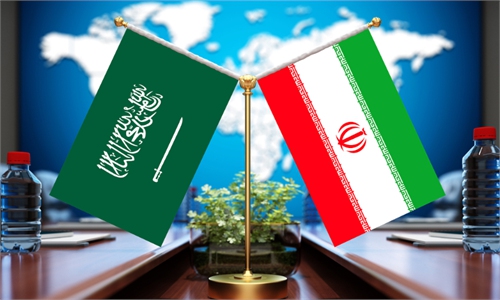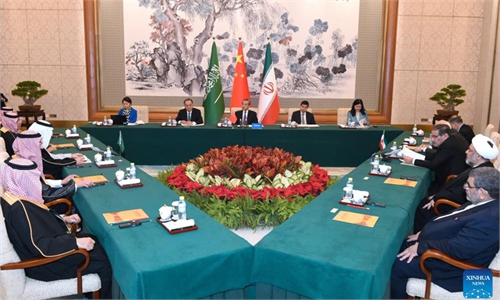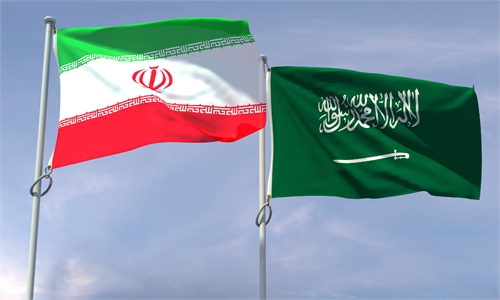That trust was precious when Saudi Arabia and Iran talked in Beijing: Global Times editorial

Wang Yi (C), a member of the Political Bureau of the Communist Party of China (CPC) Central Committee and director of the Office of the Foreign Affairs Commission of the CPC Central Committee and director of the Office of the Foreign Affairs Commission of the CPC Central Committee, attends a closing meeting of the talks between the Saudi delegation led by Musaad bin Mohammed Al-Aiban (L), Saudi Arabia's Minister of State, Member of the Council of Ministers and National Security Advisor, and Iranian delegation led by Admiral Ali Shamkhani (R), Secretary of the Supreme National Security Council of Iran, in Beijing, capital of China, March 10, 2023. Wang Yi presided over the closing meeting here on Friday. (Xinhua/Luo Xiaoguang)
The talks between Saudi Arabia and Iran in Beijing have achieved significant success, causing a sensation worldwide. The international community, including Arab countries, the United Nations, the European Union, and others, has welcomed this outcome and doubled their expectations for the prospects of peace in the Middle East. To be honest, in recent years, there have been many world-shaking events, but most of them have been sad news about war, conflicts and disasters, and the international community's attitudes toward them have become increasingly polarized. The success of the Saudi Arabia-Iran talks in Beijing has received highly unanimous applause and cheers from the international community unseen in a long time. This genuine excitement reflects the current common aspirations of the world's people.For quite a long time, the hostility between Saudi Arabia and Iran was regarded by outsiders as a "Cold War" in the Middle East and has profoundly affected the region's security. Many countries have attempted to "mediate" but have not succeeded. As two countries respectively belong to the Sunni branch and Shia branch of Islam and the two largest countries on both sides of the Persian Gulf, the "knot" between Saudi Arabia and Iran is entangled with too many complex factors such as history, religion and geopolitics and easing the conflict between the two countries has once become an "impossible mission." It is no exaggeration to say that perhaps most people did not believe that this knot could be untied the day before the Beijing talks yielded results. It is precisely because of this that both countries expressed their gratitude for China's significant role in mediating the negotiations, and UN Secretary-General António Guterres also expressed his appreciation for China's efforts.
How can China achieve this success? It is first of all because peace and development have long been desired in the Middle East. The more they suffer from war, the stronger this desire grows, and the more powerful the seed of peace becomes to overcome all kinds of obstacles. This is precisely in line with China's Global Security Initiative and Global Development Initiative.
As a responsible major power, China has always dealt with Middle Eastern countries in an amicable and respectful manner, and has always been an important constructive force in promoting peace and supporting the development in the Middle East. Over the years, China has made continuous efforts in regional peace and security and spoken out on regional hotspot political issues. The Saudi Arabia-Iran talks in Beijing are a successful practice of China's Global Security Initiative.
The goodwill and sincerity of China have gained the trust of all parties concerned. China's approach to resolving the issue has also been recognized and displayed strong attractiveness. This demonstrates that no matter how complex the problem or how daunting the challenge is, as long as dialogue is conducted on an equal footing and in a spirit of mutual respect, a solution that both sides can accept can certainly be found.
From whichever perspective, the handshake and reconciliation between Saudi Arabia and Iran in Beijing are a milestone, and they also provide a template for the resolution of complex disputes. People in regions and areas that have suffered from war, such as Yemen, Syria, Ukraine and other parts of the world, can see hope for dialogue and the dawn of peace.
It's noticeable that although the US government has reluctantly "welcomed" this result, there are many sour voices in Washington. They even felt "deeply uneasy" about the role of China as a peace mediator. It must be emphasized that China supports Middle Eastern countries in adhering to strategic autonomy, strengthening unity and cooperation, shaking off external interference, and truly grasping the future and destiny of the region in their own hands. The Saudi Arabia-Iran dialogue should indeed serve as a warning to US' Middle East policy, that the approach of creating crises and conflicts and rallying one country against another will never truly win the hearts of the people. If Washington continues this path, it will only face more frustration, not only in the Middle East, but also in other parts of the world.
China has no private interests in mediating the resumption of Saudi Arabia-Iran diplomatic ties. We genuinely feel glad for the progress made by Saudi Arabia and Iran, and we also hope to see world powers, including the US, work with China to fully recognize and respect the calls for peace and development in the Middle Eastern region, and make constructive efforts to resolve disputes through political means in this region and even in other parts of the world. We believe that achieving reconciliation through dialogue, and development through peace, will have a deeply profound influence and gain huge popularity in this era, and only victory for peace is a true victory.



